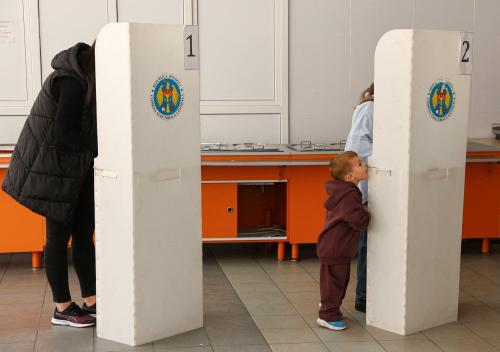The U.S. government makes a big effort to reach out to important think tanks, often through the little noticed or understood mechanism of small, private and confidential roundtables. Indeed, for the ambitious Washington think-tanker nothing quite gets the pulse racing like the idea of attending one of these roundtables with the most important government officials. The very occasion is full of intrigue and ritual.
When the Government Calls for Advice
First, an understated e-mail arrives from some polite underling inviting you in to a “confidential, off-the-record” briefing with some official with an impressive title—a deputy secretary or a special assistant to the president, maybe even (heaven forfend) the secretary of state or the national security advisor. The thinker’s heart leaps, “they read my article; they finally see the light of my wisdom, I will probably be the next national security advisor.”
He clears his schedule of any conflicting brown bags on separatism in South Ossetia and, after a suitable interval to keep the government guessing as to his availability, replies that he might be able to squeeze it in to his schedule. Citizenship data and social security numbers are provided for security purposes, times are confirmed and ground rules are established in a multitude of emails with a seemingly never-ending array of staffers, all of whose titles include the word “special.” The thinker says nothing directly to his colleagues, but searches desperately for opportunities to obliquely allude to the meeting: “I’d love to come to your roundtable on uncovered interest rate parity, but I unfortunately have a meeting with the secretary of defense.”
On the appointed day, the thinker arrives early as instructed at an impressively massive and well-guarded government building, clears his ways through multiple layers of redundant security, and is ushered into a wood-paneled room that reeks of power and pine-sol. (Sometimes it is a futuristic conference room filled with television monitors and clocks that give the time wherever the President happens to be.) Nameless peons in sensible suits clutch government-issue notepads around the outer rim of the room as the thinker takes his seat at the center table, only somewhat disappointed to see so many other familiar thinkers in the room—including some to whom he had been obliquely hinting about the meeting the day before.
At the appointed hour, an officious staffer arrives to announce that “He” (the lead government official goes only by personal pronoun—names are unnecessary at this level) is unfortunately delayed at another meeting on the urgent international crisis of the day, but will arrive just as soon as he can get break away from the president in the Situation Room. He is, in fact, just reading email, but his long career has taught him the advantage of making people wait.
After 15 minutes of stilted chit-chat with colleagues that the thinker has the misfortune to see at virtually every event he attends in Washington, the senior government official strides calmly into the room, plops down at the head of the table and declares solemnly what a honor it is to have such distinguished experts to help with this critical area of policy. He very briefly details how very hard the U.S. government is working on this highest priority issue and declares that “we are in listening mode and are anxious to hear your sage advice.” A brave thinker raises his hand and speaks truth to power by reciting the thesis of his latest article. From there, the group is off to races as the thinkers each struggle to get in the conversation and rehearse their well-worn positions.
Forty-three minutes later, the thinkers’ “hour” is up because, the officious staffer interjects, “He” must attend a Principals Committee meeting. The senior government official thanks the experts for coming, compliments them on their fruitful ideas and their full and frank debate, instructs a nameless peon at random to assemble “what was learned here” for distribution in “the building” and strides purposefully out of the room.
The pantomime then ends and the thinker retreats back to his office to continue his thoughts. But what precisely has happened behind the rituals? Have we witnessed the vaunted academic-government exchange that Washington is so famous for? Is this how fresh ideas re-invigorate stale government groupthink?
Thinkers Act as Validators of Policy (Even the Critics)
Having been on both sides of the table for these exchanges, I have some sense of what all of this pomp and circumstance mean. It is not what it seems, but it is nonetheless important and does have a role in the policy process. The idea of this meeting is not to bring outside ideas into the government. To the senior government official, an outside idea—even a good one—is like a diamond ring on a desert island: abstractly valuable but practically useless. Regardless of his vaunted status, he feels in his daily existence penned in on every side by political and resource considerations that outsiders simply refuse to acknowledge. As he nods appreciatively and appears to hang on every word the thinkers spout, he is, in fact, hiding his tired familiarity with all of their arguments and his deep-seeded belief that every idea he hears is either politically impossible or already being attempted (or both).
But he is also genuinely extremely busy, so why does he bother? He bothers because the thinkers are important to him—but, ironically, not because of their thoughts. The thinkers are the validators. They will write op-eds, give pithy quotes to important newspapers, and appear on network news programs. The government official desperately wants the thinkers to give him the benefit of the doubt when his inevitably flawed policy comes up for critical examination, as they are an important source of its ultimate evaluation by the Congress and the public. The briefings therefore tend to take place before important diplomatic meetings or foreign trips that will predictably occasion a round of media coverage on the policy in question.
Many of the thinkers understand these dynamics. They get that no one ever really airs dirty laundry at a roundtable and they prefer to rely on more private meetings to squeeze their government contacts for real information. But these meetings do help them. They increase their ability to name drop and imply great access, “I was with the deputy secretary yesterday and he mentioned that ….” This capacity enhances their external credibility; with media and funders, as well as with their peers and so they are willing to subject themselves to the effort at brainwashing.
So how do you convince a self-aware expert that already believes he knows everything that a necessarily imperfect policy is the best option? Not through direct persuasion—the senior government official, if he is wise, spends little time trying to defend the policy. Rather one persuades simply through the fact of the meeting itself, the access to power it seems to provide and the rituals associated with that power. The meetings, their grandeur and secrecy, are intended to foster a sense that the thinkers have been listened to and thus are somehow complicit in the policy—the illusion of inclusion. A meeting that seems to the thinker to be an opportunity to persuade is actually an opportunity to be persuaded. It doesn’t always work, of course. Fundamental positions are rarely altered and many of the supposed validators will remain fierce critics. But the biggest secret of all is that, even if the thinker does understand the real purpose, it often works at least at the margins. Power is not only the ultimate aphrodisiac; it is also quite convincing.
The views expressed in this piece are those of the author and should not be attributed to the staff, officers or trustees of the Brookings Institution.
The Brookings Institution is committed to quality, independence, and impact.
We are supported by a diverse array of funders. In line with our values and policies, each Brookings publication represents the sole views of its author(s).



Commentary
Who Influences Whom? Reflections on U.S. Government Outreach to Think Tanks
June 4, 2014